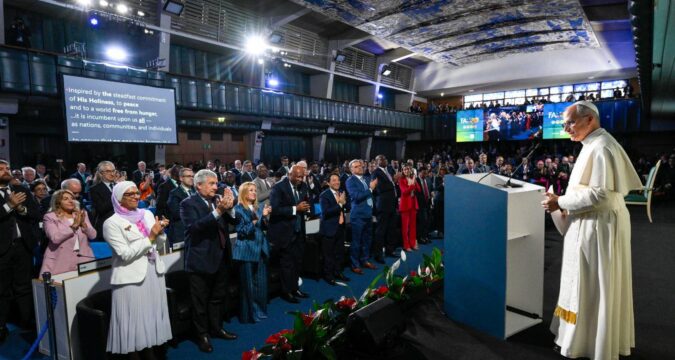
ROME (CNS): “Allowing millions of human beings to live—and die—as victims of hunger is a collective failure, an ethical aberration, a historical fault,” Pope Leo XIV said on October 16, World Food Day.
The pope drove across Rome to address world leaders and government representatives at the headquarters of the UN Food and Agriculture Organisation [FAO]. In addition to marking World Food Day, the delegates were celebrating the 80th anniversary of FAO’s establishment.
In his speech, Pope Leo decried the fact that while humanity has made huge advances in technology, medicine, agriculture and transportation, 673 million people go to bed hungry each night, and 2.3 billion people cannot afford a healthy diet.
The FAO statistics are not just numbers, he said; “behind each of these numbers is a broken life, a vulnerable community.”
Pope Leo insisted, “This is not a coincidence, but the clear sign of a prevailing insensitivity, of a soulless economy, of a questionable model of development, and of an unjust and unsustainable system of resource distribution,”
How can we explain the inequalities that allow a few to have everything, while so many have nothing?
Pope Leo
Perhaps referring to the situation in Gaza, but also to other war zones, the pope said that “current conflict scenarios have brought back the use of food as a weapon of war.”
A global conviction that “deliberate starvation as well as the intentional obstruction of access to food for communities or entire peoples, constitutes a war crime” seems to be slipping away, he said.
The pope decried “cruel strategy” of using food as a weapon of war, the pope said, “condemns men, women and children to hunger by denying them the most basic right: the right to life.”
While governments have an obvious role in addressing hunger, Pope Leo said no one can consider the problem to be someone else’s responsibility.
“Those who suffer from hunger are not strangers,” he said. “They are my brothers and sisters, and I must help them without delay.”
Hunger “is a cry rising to heaven, demanding a swift response from every nation, from every international body, from every regional, local or private entity,” he said. “It is a battle that belongs to us all.”
This is not a coincidence, but the clear sign of a prevailing insensitivity, of a soulless economy, of a questionable model of development, and of an unjust and unsustainable system of resource distribution
Pope Leo
Pope Leo asked, “How can we explain the inequalities that allow a few to have everything, while so many have nothing?”
The pope added, “How can we fail to remember all of those who are condemned to death and hardship in Ukraine, Gaza, Haiti, Afghanistan, Mali, the Central African Republic, Yemen and South Sudan, to name just a few places on the planet where poverty has become the daily bread of so many of our brothers and sisters?”
No individual or government can look the other way, the pope said. “We must make their suffering our own.”
The pope said, “We cannot aspire to a more just social life if we are not willing to rid ourselves of the apathy that justifies hunger as if it were background music we have grown accustomed to.”
Failure to act, even for individuals, he said, is to be “complicit in the promotion of injustice.”
Pope Leo said, “We cannot hope for a better world, a bright and peaceful future, if we are not willing to share what we ourselves have received. Only then can we affirm—with truth and courage—that no one has been left behind.”








